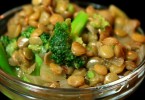‘Eating to lose weight’ may sound incredulous at the outset, but if you cultivate good eating habits and make some smart diet decisions, it could very well be the only weight control solution you will ever need. While it’s easier said than done, it is not that difficult a feat.
* Eat at the right time – Setting fixed meal times and abiding to these is a good way to initiate the right eating habits. Eating at irregular hours is one of the biggest contributors to weight gain, but by conditioning your body and mind, you can easily step out of this unhealthy eating pattern. Set aside a time for breakfast, lunch and dinner and try to build a routine around these time windows. When your body is trained to expect food at a certain time, it will not crave for snacks at random intervals.
* Eat at the right frequency – Break down your total food intake for the day into 5 or 6 essential meals. Every meal need not be a complete 7-course meal, but a nutritious one that helps keep your body’s sugar levels balanced, and prevents any unwanted hunger pangs. Eating moderately at regular interval also boosts your metabolism and improves digestion.
* Eat the right amount – In addition to eating on time and at regular intervals, eat the right amount of food too. If you are prone to over-eating, reduce the size of your servings and limit yourself to a single serving. Since you are going to eat again after a while, you need not worry about stocking up on energy for later. Eat till you are almost satisfied, but never overdo it even if it is your favorite food.
* Eat right – Restricting meal portions and setting a time table for eating can only get you so far. You have to ensure that whatever goes inside you is good for you. Choose complex carbohydrates over simple ones, load up every meal with minerals and vitamins, eat lean protein and get adequate fiber into your diet. In simpler words, when it comes to choosing the right carbohydrates, eat whole grains and legumes. For proteins, choose non-fat dairy, soya, eggs, lean meat and fish, which also contain omega-3 fatty acids and linoleic acid (essential fats). Try to stay away from processed foods and pick fresh, organic produce instead. Fiber-rich foods consume more calories for digestion (negative calorie effect), thereby making you feel satisfied and fuller for longer. Also foods like apple, celery, carrots, chilies, berries, onions and green tea improve metabolism and accelerate weight loss. Aim towards an organic and balanced diet to stay fit and healthy.
* Eat and tell – Keeping a log of your calorie intake will make you aware of all your habits and tendencies. If you slip and have junk food, you will have an excruciating time making that entry in your food journal. Keeping a food diary is one of the best ways to keep yourself disciplined and motivated.
* Hydrate – Dehydration is often misconstrued as hunger and leads to over eating. Make sure that you drink plenty of water to keep yourself hydrates. A minimum of 8 ounces of water is recommended daily to keep water retention and bloating at bay.
With a little caution and deliberation, you can achieve a perfect balance in your diet and with some smart dietary inclusions and exclusions, losing weight will become easier than you anticipated.
Visual Courtesy:http://www.flickr.com/photos/robboudon/







